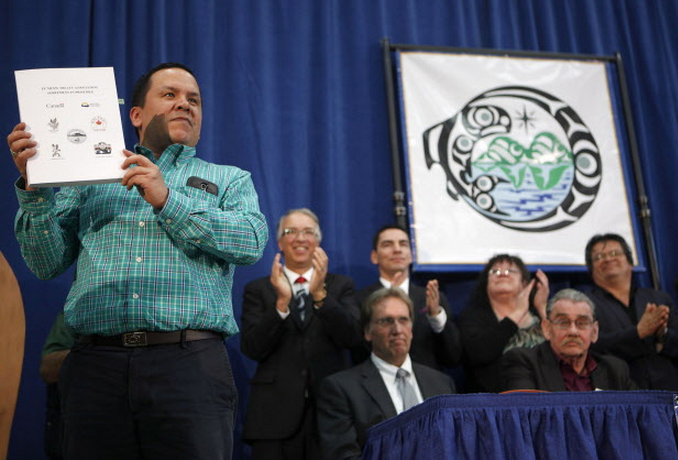VANCOUVER – The chasm that exists in the relationship between British Columbia’s political and aboriginal leaders was clearly defined Wednesday as talks got underway at a Vancouver hotel in the second annual all-chiefs meetings.

While B.C.’s Aboriginal Relations Minister John Rustad said there has been remarkable achievements on economic and social fronts with First Nations, chiefs are threatening to go back to court battles and protest camps if things don’t improve.
About 500 First Nations leaders are meeting with Premier Christy Clark and members of her cabinet this week with the expectation of signing a joint government-First Nations working agreement.
Grand Chief Stewart Phillip, president of the Union of B.C. Indian Chiefs, said they’re giving the government a one-year deadline to negotiate a reconciliation deal.
“The underlying message is if we don’t make any progress within the space of the next year, I would suggest all of this will fall through and it will be back to the courts and pretty much back to the barricades,” said Phillip.
Last year’s landmark Supreme Court of Canada decision that granted the Tsilhqot’in Nation aboriginal title to 1,700 kilometres of land in B.C.’s Nemiah Valley remains the driving force behind the reconciliation initiative prompted by Clark and First Nations leaders.

Get breaking National news
The decision is the first in Canadian history where aboriginals have been granted title to land they claimed as their own. Tsilhqot’in Chief Roger William said the ruling gives First Nations a legal tool to use as leverage in negotiations with governments and resource developers.
Legal scholars and political experts have suggested the ruling gives aboriginals massive powers on land-use issues, especially resource development. B.C. First Nations are seeking government support for aboriginal rights and title to lands, which also includes revenue sharing.
Phillip said all involved must have the courage to move forward, build consensus and silence those who predict Armageddon if First Nations are given an equal voice in building and sharing B.C.’s economic future.
Clark has said ignoring the Supreme Court ruling puts B.C.’s future in peril, prompting her to meet with the chiefs and councillors from B.C.’s more than 200 First Nations.
Phillip said chiefs left last year’s meeting disappointed because the province did not adopt a four-point statement that established government support for their rights and title to lands.
“The last time we couldn’t even agree on a public statement,” said Phillip, adding when it comes to reconciliation B.C. is at “strike two.”
“We need a legislative framework and a policy framework we can rely on that allows us to reconcile aboriginal title rights interests and other Crown and industry interests. We don’t have that.”
Phillip said the economy of B.C. hangs in the balance and all parties are aware of the gravity of the situation.
Rustad said the provincial government’s relations with First Nations over the last decade on numerous economic and social fronts have been ground-breaking.
The handful of First Nations who have negotiated land-claims treaties have produced spectacular results, but the process takes too long, he said.
“We need to be able to find a way to do this in a much more expedited manner.”
While much of the conference is closed to the media, Clark is expected to make a public address before the chiefs on Thursday.







Comments